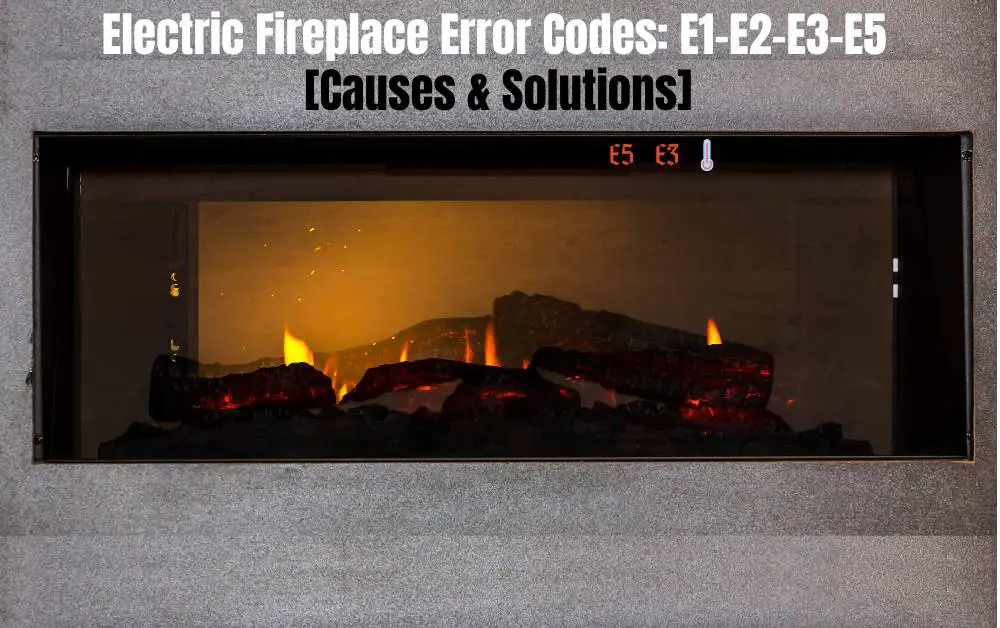Electric fireplaces bring the warmth and ambiance of a traditional fireplace into modern homes with simplicity and style. They’re convenient and don’t require fuel, yet, just like any appliance, they occasionally encounter issues.
One common problem electric fireplace owner encounter is unusual sounds coming from the unit. From humming to grinding, these noises can not only disrupt your peaceful environment but also indicate that some internal components may need attention.
This guide covers the most common electric fireplace sounds, what causes them, and how you can fix them effectively.
Why Do Electric Fireplaces Make Unusual Sounds?
Electric fireplaces are designed to operate quietly, often producing soft crackling sounds to mimic a real fire. However, when the fireplace makes unusual noises, it’s essential to address them as they may signal a problem.
Recognizing the difference between normal and unusual sounds can help maintain the fireplace’s health and avoid costly repairs.
Electric Fireplace Unusual Sounds & Fixes
Electric fireplaces can produce various unusual sounds during operation, often indicating underlying issues that may require attention. Here are some common noises you might encounter, along with their potential causes and fixes:
- Grinding Noise
- Cause: This sound typically arises from the flame motor or the internal mechanisms that create the flame effect. If the noise occurs only when the heater is on, it may be related to the blower fan or the motor that drives the flame effect.
- Fix:
- Check for loose connections and tighten screws to reduce vibrations that could cause grinding.
- If the grinding persists, consider replacing the flame motor if it shows signs of wear or damage.
- Buzzing Noise
- Cause: A buzzing sound can indicate a problem with the flame speed control or an issue with electrical components.
- Fix:
- Test the fireplace in flame-only mode to see if the buzzing continues; if it does, inspect the flame speed control mechanism.
- If the noise only occurs when the heater is activated, the blower motor may need servicing or replacement1.
- Humming Noise
- Cause: This can be linked to electrical components or motors that are not functioning correctly.
- Fix:
- Ensure all electrical connections are secure and free from dust or debris that might cause interference.
- If cleaning does not resolve the issue, further inspection of internal components may be necessary.
- Clicking Noise
- Cause: Clicking sounds can occur when components are engaging or disengaging, often related to relays or switches.
- Fix:
- Inspect and tighten any loose parts within the unit. A professional technician may be needed if you cannot identify the source of the clicking.
- Grinding or Rattling Noises
- Cause: Grinding or rattling noises often stem from loose components within the fireplace. This can include screws, bolts, or internal parts that have come dislodged due to regular use and vibrations from the fan motor.
- Fix: Inspect the fireplace for any loose screws or components and tighten them as necessary. Ensure that all parts are securely fastened to minimize vibrations that can lead to grinding sounds.
- Popping Noises
- Cause: Popping sounds may indicate electrical issues, such as faulty circuits or voltage fluctuations. They can also occur if there are thermal expansions within the heating elements.
- Fix: Check the electrical connections and ensure the fireplace is properly grounded. If popping persists, consult a professional to inspect the electrical components for faults.
- Squealing or Squeaking Noises:
- Cause: These noises are usually associated with the blower fan or motor bearings that may be worn out or lack lubrication.
- Fix: Lubricate the fan motor bearings according to the manufacturer’s instructions. If squealing continues, consider replacing the fan motor if it shows signs of wear.
- Buzzing Noise:
- Cause: A buzzing sound often points to issues with the flame speed control module or problems with the fan motor. It may also arise from electrical interference.
- Fix: Adjust the flame speed settings to see if it resolves the buzzing. If not, inspect the flame speed control module for defects and replace it if necessary.
- Whistling or Hissing Noises:
- Cause: Whistling or hissing sounds can result from air escaping through gaps in the unit or issues with internal components like the blower fan.
- Fix: Check for any gaps or leaks in seals around the fireplace. Tightening screws and ensuring all components fit snugly can help eliminate these noises.
- Scraping or Clanking Noises:
- Cause: Scraping or clanking noises typically indicate that moving parts are rubbing against each other, often caused by misalignment of internal components.
- Fix: Unplug the fireplace and carefully inspect it for any misaligned parts. Realign any components that appear out of place and ensure everything is securely fastened
General Maintenance Tips
-
Dust and debris accumulation can significantly increase noise levels. Regularly clean out blower fans and internal components to maintain optimal performance.
-
Over time, screws and panels can loosen due to vibrations. Periodically check and tighten these components to minimize noise.
-
If unusual noises persist despite troubleshooting, consider having a professional inspect your electric fireplace for deeper mechanical issues.
You May Also Like to Read:
FAQs
What causes electric fireplaces to make noise?
Electric fireplaces can produce noise due to lose parts, worn components, dust buildup, or electrical issues.
Are electric fireplace sounds normal?
Some soft sounds, like crackling, are normal. Unusual or loud sounds may indicate a problem needing attention.
Can I use regular oil to lubricate my fireplace?
No, use high-temperature lubricants meant for electric appliances to avoid damage.
How often should I service my electric fireplace?
Regular inspection every 6-12 months is ideal, with additional servicing if unusual sounds are detected.
Is it safe to troubleshoot electric fireplace noises myself?
Basic maintenance is generally safe but seek professional help for electrical repairs or if unsure about handling specific parts.
Affiliate Disclosure: Fireplaceadviser.com is a participant in the Amazon Services LLC Associates Program. We may earn a commission when you click on certain links on this site and purchase.

Hello!! I am Jamal Khan. I often fix my home electric heaters and gas stove problems and research the common issues in the heating units to improve my knowledge and expertise. The aim of establishing fireplaceadviser.com is to share my expertise and knowledge with my audience.












